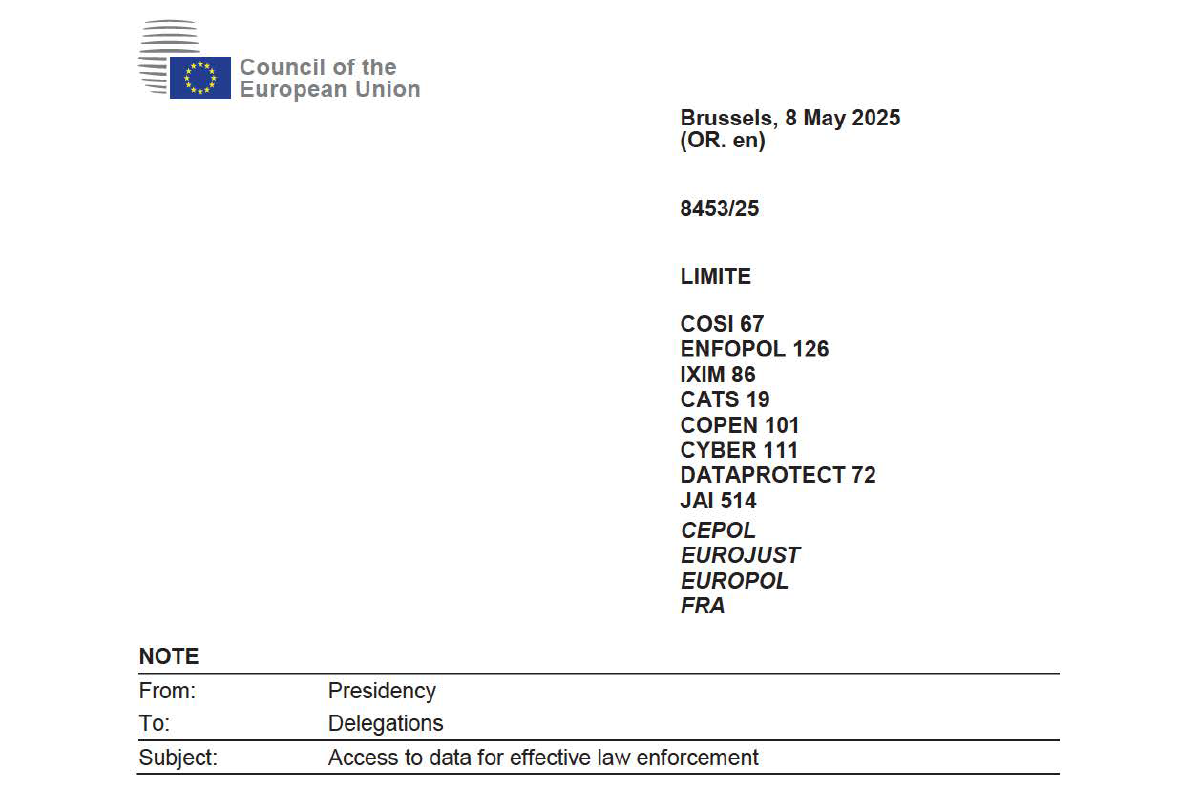Document: Access to data for effective law enforcement
Topic
Country/Region
13 June 2025
The Council of the EU's proposed priorities for law enforcement access to data, covering: measures to be implemented immediately; priorities for the European Commission's upcoming "roadmap to ensure lawful and effective access to data"; and ideas for ways to "foster a constructive public discourse."
Support our work: become a Friend of Statewatch from as little as £1/€1 per month.

In the document (pdf), the Polish Presidency proposed that states should implement the following as soon as possible:
-
- Member States should consider sharing available digital forensics tools, e.g. software licences, with the law enforcement authorities of other Member States through the Europol Innovation Lab’s Europol Tool Repository (ETR)
- Europol and Eurojust should set up a joint project to facilitate the sharing of knowledge and expertise in digital forensics
- The European Cybercrime Training and Education Group (ECTEG), supported by the European Union Agency for Law Enforcement Training (CEPOL), should put in place an EU certification scheme and additional training opportunities for digital forensics experts
- Member States should support the activities under the EU Innovation Hub for Internal Security’s thematic cluster on encryption, including on exploring a European approach for the management of vulnerabilities in internal security
- The Commission and Member States should consider raising awareness about possible solutions facilitating lawful access to data and devising cross-cutting initiatives under EMPACT (European Multidisciplinary Platform Against Criminal Threats)
- The European Working Group on Standardisation on Internal Security coordinated by Europol should propose ways to foster and better coordinate Member States’ participation in standardisation fora, building upon the existing standards developed by the European Telecommunications Standards Institute (ETSI)
- Member States should make best use of cooperation with industry, standard-setting, and building or acquiring relevant tools when preparing for the implementation of the e-evidence regime
- Member States should consider concluding memoranda of understanding with private parties, laying down the principles of cooperation with industry, as well as leveraging the experience gained through SIRIUS, with a view to enhancing transparency and getting access to categories of available data
- Experts from Member States and relevant EU agencies are encouraged to apply to join the research group that will be established by the Commission to help assess the technical feasibility of lawful access obligations in compliance with fundamental rights and without undermining cybersecurity
Document
- Access to data for effective law enforcement (Council doc. 8453/25, LIMITE, 8 May 2025, pdf)
Our work is only possible with your support.
Become a Friend of Statewatch from as little as £1/€1 per month.
Further reading

"Deep concern" over EU's plan "to weaken or circumvent encryption"
The European Commission should reinforce and support that enable private communication, says a joint letter signed by almost 90 organisations, companies and technical experts. The Commission's recent Internal Security Strategy says there is a need to "enable law enforcement authorities to access encrypted data in a lawful manner," alongside a host of other proposals on policing and security. Statewatch is a signatory of the letter.

EU police data plans pose "substantial security and privacy threats"
EU plans to increase police access to personal data could weaken "fundamental rights, legal safeguards and the European economy." The warning comes in an open letter addressed to the EU Justice and Home Affairs Council, and is signed by more than 50 organisations, including Statewatch. The signatories include NGOs, businesses, journalists' unions, lawyers' associations, and others.

Increased number of EU laws face scrutiny from internal security officials
Security issues need to be considered in all EU policies, say draft "strategic guidelines in the field of Justice and Home Affairs" obtained by Statewatch. The guidelines will be adopted by the European Council to guide law and policy-making between 2024 and 2029. They also call for "adequate EU funds" to ensure implementation of the Pact on Migration and Asylum, the expansion and interconnection of policing and migration databases, and for other issues such as plans to increase deportations.
Spotted an error? If you've spotted a problem with this page, just click once to let us know.

